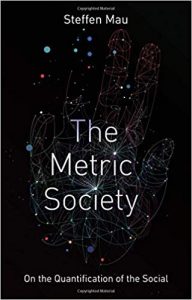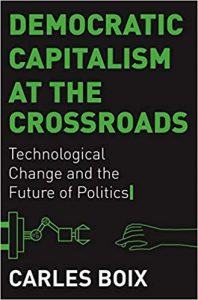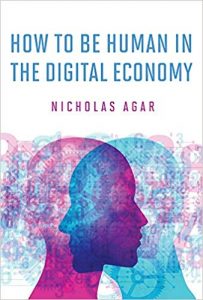I spent the holiday weekend sitting in the sunshine reading digital economy books of varios types (in between cooking for the family and playing with the 10 week-old). First up was Steffen Mau’s The Metric Society, one of the slowly expanding genre of sociology of economic measurement books. The underlying theme is the use of metrics to quantify the qualitative, and the consequences of the appearance of objectivity: “By assigning a number to the thing observed, we take a step toward objectivizing it.” At the same time, measurement ‘disembeds’ phenomena from local context and knowledge. “Numbers not only isolate information from its original context but also place it in extended comparative contexts.” The added spice in this book is the ever-growing scope of the use of data as digitalisation marches on. And, like other similar books, The Metric Society is pretty pessimistic – this implies, it suggests, a panopticon society with entrenched structures of inequality. After all, “Categorical systems, once established, become extremely hard to overthrow.” However, I decided the power of numbers gives some reason to be cheerful. As Mau writes: “The nomination power invested in indicators, data and measurements can potentially restructure whole areas of society and impose new logics of action.” As Lenin said (quoted here): “We must carry statistics to the people and make them popular.” My new motto. While people might find an obsession with economic statistics a bit – nerdy – in fact it’s a revolutionary programme!
 [easyazon_link identifier=”150953041X” locale=”UK” tag=”enlighteconom-21″]The Metric Society: On the Quantification of the Social[/easyazon_link]
[easyazon_link identifier=”150953041X” locale=”UK” tag=”enlighteconom-21″]The Metric Society: On the Quantification of the Social[/easyazon_link]
The second book was a proof copy of Democratic Capitalism at the Crossroads by Carles Boix, out next month. I probably shouldn’t give too much of a preview before its publication date, but this is about the interplay between the economics and politics of digital – as the subtitle puts it, ‘technological change and the future of politics.’ The first half of the book compares three modes of capitalism, the 19th century Manchester variety, the 20th century Detroit variety and the 21st century Silicon Valley one. The second part discusses the interaction between digital technology, especially AI, and the labour market. Quite a lot of this covers the economic literature on the issue of the skill bias of technical change, and the resorting of jobs into tasks in extended supply chains, so this is familiar territory. The polarisation of jobs and wages is linked to populist politics and the prognosis is somewhat gloomy – the author is a bit techno-determinist, taking the ‘half of all jobs’ to be taken by robots line as more of a forecast than a thought-experiment. The book ends with some rather generic recommendations – enhance skills, pay a universal basic income. I’m sure it’s right to draw the link between the economic and political polarisations, but I’m more in the territory of taxing multinationals, capping CEO pay, enforcing competition policy etc.
 [easyazon_link identifier=”0691190984″ locale=”UK” tag=”enlighteconom-21″]Democratic Capitalism at the Crossroads[/easyazon_link]
[easyazon_link identifier=”0691190984″ locale=”UK” tag=”enlighteconom-21″]Democratic Capitalism at the Crossroads[/easyazon_link]
The third was How to Be Human in the Digital Economy by Nicholas Agar. It advocates ensuring there are ‘human’ jobs as more and more activities get automated – in effect, the book takes Baumol’s well-known prediction about the growing share of employment in the least productive sectors, and, labelling this the ‘social economy’, argues against seeking ever greater efficiency in these jobs. Although I agree – and hence it means interrogating what we mean by ‘productivity’ in different types of job – I found the book rather rhetorical. Eg, “AI is the digital superpower that thwarts traditional human responses to technological unemployment.” Whereas Boix has rather too many numbers and charts, Agar has too few. The latter’s suggestion for paying for the “less productive” social economy is the Lanier/Weyl data-as-labour idea, but otherwise it is not very specific about how to create the desired social economy.
 [easyazon_link identifier=”0262038749″ locale=”UK” tag=”enlighteconom-21″]How to Be Human in the Digital Economy (The MIT Press)[/easyazon_link]
[easyazon_link identifier=”0262038749″ locale=”UK” tag=”enlighteconom-21″]How to Be Human in the Digital Economy (The MIT Press)[/easyazon_link]
Anyway, it’s quite interesting to see this crop of books on AI/digital and the future of the capitalist democracies. No doubt there are many more to come.

On metrics, the gini coefficient seems too abstract to be used as a policy guide.
I’m now thinking of the 1%/median ratio, top 1% level income over the median income, and the 10%/median ratio (using the level of income at the top 10%, top decile).
In a society which is growing more fairly, the median income will grow as fast or faster than that of the top 10% or top 1%. This would be a “fair” system, overall.
I’m strongly against the UBI, but even more strongly in favor of policies to support private job creation, and including a gov’t “National Service” which accepts everybody as a volunteer, and pays them 80% of the lowest enlistment wage into the Army.
I didn’t see any titles of books which seem to clearly favor a Job Guarantee or even UBI.
Very inspiring article!